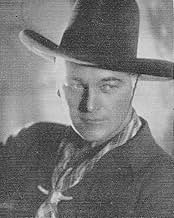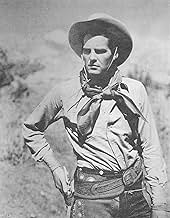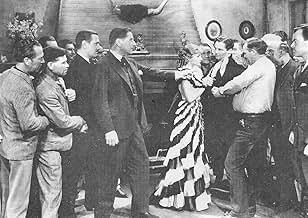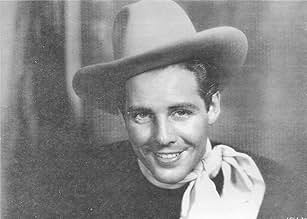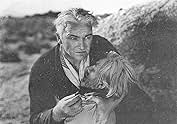Ajouter une intrigue dans votre langueAn evil ranch foreman tries to provoke a range war by playing two cattlemen against each other while helping a gang to rustle the cattle.An evil ranch foreman tries to provoke a range war by playing two cattlemen against each other while helping a gang to rustle the cattle.An evil ranch foreman tries to provoke a range war by playing two cattlemen against each other while helping a gang to rustle the cattle.
- Réalisation
- Scénario
- Casting principal
James Ellison
- Johnny Nelson
- (as Jimmy Ellison)
George 'Gabby' Hayes
- Uncle Ben
- (as George Hayes)
Sid Jordan
- Wrangler
- (non crédité)
John Merton
- Party Guest with a Pint in His Hip Pocket
- (non crédité)
Pascale Perry
- Outlaw Guard
- (non crédité)
Joe Phillips
- Party Guest
- (non crédité)
Monte Rawlins
- Cowhand Party Guest
- (non crédité)
Avis à la une
William Boyd, a hugely popular actor during the silent film era, saw his career wilting in the early 1930s after a mix-up by a newspaper sent his reputation spiraling downwards. When he auditioned for Paramount Pictures' low-budgeted Western, August 1935 "Hop-Along Cassidy," the studio offered him the role as one of the ranch supervisors-but not the lead. Boyd knew his on-screen magnetic personality was perfect for the series' hero, and lobbied hard for the role as Bill Hop-Along Cassidy. The actor eventually beat out his competition, and the life-changing role became one of Hollywood's more feel-good stories in cinema.
Western movies had been relegated to 'Poverty Row" status ever since the spectacular failure of Raoul Walsh's 1930 "The Big Trail." The Grade B "program westerns" were quickly churned out with their low quality camerawork and acting, and played in largely rural theaters. Paramount Pictures wanted to elevate the genre by producing a series with upgraded storylines, higher production values and more polished acting. The studio eventually realized Boyd's past film experience was an asset to achieve its goals. At first the part was offered to James Gleason (not the comedian), but the actor had just signed a deal with RKO and was handcuffed. Once Boyd got the role, the series became a long-lasting fan favorite right from its premier, lasting well beyond going to the new medium of television in 1948. Hopalong Cassidy's programing is credited for making Westerns the most popular genre in the early days of TV.
Boyd first appeared in film in 1918, and was a favorite of director Cecil B. DeMille in his role as Simon in 1927's "The King of Kings." His lead in 1926's silent "The Volga Boatman," DeMille's personal favorite, solidified Boyd's reputation when cinema transitioned to talkies. But RKO cut him loose when its executives read a newspaper account alongside Boyd's picture that he was arrested on gambling and illegal alcohol charges. The editors mixed him up with another actor named William 'Stage" Boyd, who was the real culprit. Yet, when the paper published a correction, "The damage was already done," Boyd lamented. No studio wanted to touch him until 'Stage' Boyd died in 1935, coincidently the same year William earned the Cassidy role.
Boyd's portrayal of Hopalong didn't resemble the title character in Clarence Mulford's 1904 stories. The author's Western hero was rude, rough in speech, and constantly had a chip on his shoulder. The literary character sustained a bullet embedded in his leg during a gunfight, causing him to hop while he walked, earning the nickname 'Hopalong.' Boyd's 'Hopalong' on the screen was civil, friendly, and well-spoken. He consistently appeared on the scene whenever crooks were making honest people's lives miserable. Cassidy was accompanied by a younger man, Johnny, first played by James Ellison, who was always getting into trouble but had a yen for women in distress, along with a grizzled old man first played by actor George 'Gabby' Hayes.
Boyd played in 66 Hopalong Cassidy one-hour movies. When Hollywood studios phased out low-budget films by the time television became popular in 1948, they stopped producing Hopalong features (Boyd financed the final 12 episodes himself.). The actor, though, saw a market for those 66 Hopalong films, and mortgage everything he had, $350,000, to buy the entire catalogue from the studio. The unemployed actor Boyd approached NBC to see if the network was interested in playing some of his old Westerns. Looking for programming to fill its new medium, NBC agreed to air them for a nominal fee. A new generation of viewers grew to love the action-packed films which were shown on Sunday nights. These weekly Sunday evening one-hour Westerns became known as 'Hoppy Nights,' and Boyd emerged as one of TV's first stars, earning not only a fortune for his ownership of the series but he also received lucrative licensing contracts to market Hopalong merchandise.
In the inaugural debut of Hop-along (the only film with a hyphen in his name), Bill Cassidy works for the Bar 20 Ranch, which sees its cattle stolen one-by-one. At a nearby ranch, H2, its foreman, Jack Anthony (Kenneth Thomson), is a cattle rustler leading his gang to steal. He's blaming the Bar 20 Ranch employees for the loss of their cattle, and the two ranches soon become embroiled by Anthony's maneuvers. Writes film reviewer Laura Grieve, "All in all, it's a strong film which set a firm foundation for the many Hopalong Cassidy films and TV episodes to follow."
The character Hopalong Cassidy was nominated by the American Film Institute as one of movie's Heroes of All-Time.
Western movies had been relegated to 'Poverty Row" status ever since the spectacular failure of Raoul Walsh's 1930 "The Big Trail." The Grade B "program westerns" were quickly churned out with their low quality camerawork and acting, and played in largely rural theaters. Paramount Pictures wanted to elevate the genre by producing a series with upgraded storylines, higher production values and more polished acting. The studio eventually realized Boyd's past film experience was an asset to achieve its goals. At first the part was offered to James Gleason (not the comedian), but the actor had just signed a deal with RKO and was handcuffed. Once Boyd got the role, the series became a long-lasting fan favorite right from its premier, lasting well beyond going to the new medium of television in 1948. Hopalong Cassidy's programing is credited for making Westerns the most popular genre in the early days of TV.
Boyd first appeared in film in 1918, and was a favorite of director Cecil B. DeMille in his role as Simon in 1927's "The King of Kings." His lead in 1926's silent "The Volga Boatman," DeMille's personal favorite, solidified Boyd's reputation when cinema transitioned to talkies. But RKO cut him loose when its executives read a newspaper account alongside Boyd's picture that he was arrested on gambling and illegal alcohol charges. The editors mixed him up with another actor named William 'Stage" Boyd, who was the real culprit. Yet, when the paper published a correction, "The damage was already done," Boyd lamented. No studio wanted to touch him until 'Stage' Boyd died in 1935, coincidently the same year William earned the Cassidy role.
Boyd's portrayal of Hopalong didn't resemble the title character in Clarence Mulford's 1904 stories. The author's Western hero was rude, rough in speech, and constantly had a chip on his shoulder. The literary character sustained a bullet embedded in his leg during a gunfight, causing him to hop while he walked, earning the nickname 'Hopalong.' Boyd's 'Hopalong' on the screen was civil, friendly, and well-spoken. He consistently appeared on the scene whenever crooks were making honest people's lives miserable. Cassidy was accompanied by a younger man, Johnny, first played by James Ellison, who was always getting into trouble but had a yen for women in distress, along with a grizzled old man first played by actor George 'Gabby' Hayes.
Boyd played in 66 Hopalong Cassidy one-hour movies. When Hollywood studios phased out low-budget films by the time television became popular in 1948, they stopped producing Hopalong features (Boyd financed the final 12 episodes himself.). The actor, though, saw a market for those 66 Hopalong films, and mortgage everything he had, $350,000, to buy the entire catalogue from the studio. The unemployed actor Boyd approached NBC to see if the network was interested in playing some of his old Westerns. Looking for programming to fill its new medium, NBC agreed to air them for a nominal fee. A new generation of viewers grew to love the action-packed films which were shown on Sunday nights. These weekly Sunday evening one-hour Westerns became known as 'Hoppy Nights,' and Boyd emerged as one of TV's first stars, earning not only a fortune for his ownership of the series but he also received lucrative licensing contracts to market Hopalong merchandise.
In the inaugural debut of Hop-along (the only film with a hyphen in his name), Bill Cassidy works for the Bar 20 Ranch, which sees its cattle stolen one-by-one. At a nearby ranch, H2, its foreman, Jack Anthony (Kenneth Thomson), is a cattle rustler leading his gang to steal. He's blaming the Bar 20 Ranch employees for the loss of their cattle, and the two ranches soon become embroiled by Anthony's maneuvers. Writes film reviewer Laura Grieve, "All in all, it's a strong film which set a firm foundation for the many Hopalong Cassidy films and TV episodes to follow."
The character Hopalong Cassidy was nominated by the American Film Institute as one of movie's Heroes of All-Time.
A range war is brewing between the Bar 20 and Meeker ranches, which is being caused by Meeker's foreman Anthony (who is in reality, an outlaw called the Pecos Kid), whose method is to have each ranch be accused at acts of rustling cattle or murder, then the two ranches will start a war against each other. In the meanwhile, Anthony's gang will round up all the cattle from the two ranches, change brands, and sell them at market. It's up to Hoppy, Red, Uncle Ben, and Johnny Nelson (who is a target for Meeker's hands since Johnny is sweet on Meeker's daughter Mary) to clear the Bar 20's name and round up the outlaws. The film is a very good entry in the opening film of the Hopalong series, but far from the best, since the action doesn't really begin past the halfway point of the film. Then on it's gets better building up to a great climax. Good performances by the cast (especially by Hayes as Uncle Ben, in a pre Windy Halliday role), but Thomson is miscast and ineffective as Anthony. Rating, based on B westerns, 6.
Hoppy returns home only to get caught up in a rustlers' sceme that involves his friends Johnny (Ellison) and Uncle Ben (Hayes) and even Buck (Ming The Merciless!).
Aces all around, from great rocky locations, to better than usual acting, to a really surprising twist. From all this I can see why the Hoppy series became so popular following this first entry. Also, note that handsome youngster Ellison gets almost as much screentime as Boyd, maybe to entice younger viewers.
Then too, looks like the producers were intent on a big send-off since there's no stinting on the hard-riding gangs, cattle herds, or sustained outdoor locations.
Moreover, catch the imaginative camera set-ups that make good use of the rocky spire and action sequencess. The plot may be a bit worn, but happily it's imaginatively mounted. Also, catch the standing tree trunk that suddenly becomes a bed, along with cutie Mary's (Stone) jazzy dress that makes her stand out at the dance. All good touches.
Anyway, there's likely no better actor among matinee heroes than Hoppy's Bill Boyd as this flick abundantly shows. Ordinarily, I don't rate matinee westerns, but among them I'd give this one a "10". So, for front-row matinee fans like myself, don't miss it.
Aces all around, from great rocky locations, to better than usual acting, to a really surprising twist. From all this I can see why the Hoppy series became so popular following this first entry. Also, note that handsome youngster Ellison gets almost as much screentime as Boyd, maybe to entice younger viewers.
Then too, looks like the producers were intent on a big send-off since there's no stinting on the hard-riding gangs, cattle herds, or sustained outdoor locations.
Moreover, catch the imaginative camera set-ups that make good use of the rocky spire and action sequencess. The plot may be a bit worn, but happily it's imaginatively mounted. Also, catch the standing tree trunk that suddenly becomes a bed, along with cutie Mary's (Stone) jazzy dress that makes her stand out at the dance. All good touches.
Anyway, there's likely no better actor among matinee heroes than Hoppy's Bill Boyd as this flick abundantly shows. Ordinarily, I don't rate matinee westerns, but among them I'd give this one a "10". So, for front-row matinee fans like myself, don't miss it.
Although the Character of Hopalong Cassidy had Virtually Nothing in Common with the Author Clarence Mulford's Novels...
William Boyd and "Hoppy" Maintained one of the Most Popular and Long Running Character Features in Movie History...(66 Films & TV).
"Hoppy" in the Movies Did Not...Smoke, Drink, or Result to Violence Unless Provoked and the "Bad Guy" Drew or Punched First.
A Complete Opposite of Mulford's "Hoppy", A Grizzled, Tobacco Chewing, Ruffian.
Unrealistic to a Fault, but Not as Unrealistic as say Gene Autry, Roy Rogers or Other Kid's Heroes of the Day.
It's Not Easily Understood Why the Character was So Popular.
His Outfit was Black from Head to Toe, and sure was the Antithesis of Gene and Roy where Only the Bad-Guys Wore Black.
It was a Stunning Contrast to His Horse "Topper" an All-White Stallion.
Add to That Boyd's Hair was Completely Premature White.
These Things Certainly Helped the "Hoppy" Image.
Although Extremely Popular in His Initial Reincarnation with a Steely-Stare and an Edge,
"Hoppy's" Entrance is a Thrilling Descent Down a Steep Decline Aboard "Topper".
Boyd's "Hoppy" Became More and More Docile as the Character and the Film-Series Aged.
This First Entry, was Re-Titled "Hopalong Cassidy Enters" in Re-Release to Point Fans to the Origin,
is a Visual-Treat with Wide-Open Spaces and Horses Always Moving, Bucking, and Galloping.
The Plot Has Mystery Elements and George "Gabby" Hayes as "Uncle Ben"
Makes for a Sentimental and Emotional Touch with One-Scene Unforgettable.
For B-Western Fans...A Must See.
William Boyd and "Hoppy" Maintained one of the Most Popular and Long Running Character Features in Movie History...(66 Films & TV).
"Hoppy" in the Movies Did Not...Smoke, Drink, or Result to Violence Unless Provoked and the "Bad Guy" Drew or Punched First.
A Complete Opposite of Mulford's "Hoppy", A Grizzled, Tobacco Chewing, Ruffian.
Unrealistic to a Fault, but Not as Unrealistic as say Gene Autry, Roy Rogers or Other Kid's Heroes of the Day.
It's Not Easily Understood Why the Character was So Popular.
His Outfit was Black from Head to Toe, and sure was the Antithesis of Gene and Roy where Only the Bad-Guys Wore Black.
It was a Stunning Contrast to His Horse "Topper" an All-White Stallion.
Add to That Boyd's Hair was Completely Premature White.
These Things Certainly Helped the "Hoppy" Image.
Although Extremely Popular in His Initial Reincarnation with a Steely-Stare and an Edge,
"Hoppy's" Entrance is a Thrilling Descent Down a Steep Decline Aboard "Topper".
Boyd's "Hoppy" Became More and More Docile as the Character and the Film-Series Aged.
This First Entry, was Re-Titled "Hopalong Cassidy Enters" in Re-Release to Point Fans to the Origin,
is a Visual-Treat with Wide-Open Spaces and Horses Always Moving, Bucking, and Galloping.
The Plot Has Mystery Elements and George "Gabby" Hayes as "Uncle Ben"
Makes for a Sentimental and Emotional Touch with One-Scene Unforgettable.
For B-Western Fans...A Must See.
It was interesting for me to see this first of the Hopalong Cassidy movies last night. I saw a distinctly different Hopalong than those later movies I have seen. This one had a hard look in his eye that was most menacing and at one point, he was about to draw his gun on his own man, which made for a completely different Hopalong than the one which emerged in time. He actually resembled men of the REAL OLD WEST instead of the watered-down, lip-stick sissy version most of Western characters in the movies had--such as Gene Autry.
I remember last year I got to see the very first episode of Bonanza--the TV Western series. I noticed the same thing there how the Cartwrights were hard, rough and even deadly (the way men were in the REAL WEST) and, having watched the series over several years, I noticed they too mellowed with time.
Otherwise, I certainly enjoyed this first issue of Hopalong Cassidy. He was certainly my HERO as a small boy of 5-6 back in 1953-1954 when I first started watching him on TV. And it was good to view this one.
I won't bother with the plot. Others have already done that. But the point I made is one that clearly stood out to me about this very first movie in the series.
I remember last year I got to see the very first episode of Bonanza--the TV Western series. I noticed the same thing there how the Cartwrights were hard, rough and even deadly (the way men were in the REAL WEST) and, having watched the series over several years, I noticed they too mellowed with time.
Otherwise, I certainly enjoyed this first issue of Hopalong Cassidy. He was certainly my HERO as a small boy of 5-6 back in 1953-1954 when I first started watching him on TV. And it was good to view this one.
I won't bother with the plot. Others have already done that. But the point I made is one that clearly stood out to me about this very first movie in the series.
Le saviez-vous
- AnecdotesWilliam Boyd was originally offered the role of Buck Peters, the Bar 20 ranch foreman, but chose the role of Cassidy.
- ConnexionsEdited into Border Justice (1951)
- Bandes originalesFollowin' the Stars
Music and lyrics by Sam H. Stept and Dave Franklin
Sung by James Ellison and Frank McGlynn Jr.
Played as background music often
Meilleurs choix
Connectez-vous pour évaluer et suivre la liste de favoris afin de recevoir des recommandations personnalisées
Détails
Box-office
- Budget
- 85 000 $US (estimé)
- Durée
- 1h(60 min)
- Couleur
- Rapport de forme
- 1.37 : 1
Contribuer à cette page
Suggérer une modification ou ajouter du contenu manquant


